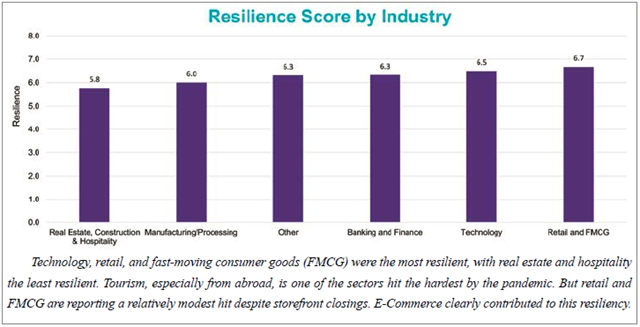Business resilience is highly correlated with level of digitisation, the Business Pandemic Resilience Diagnostic conducted by Grant Thornton Vietnam.

Business resilience is highly correlated with level of digitisation, the Business Pandemic Resilience Diagnostic conducted by Grant Thornton Vietnam, a leading provider of national audit, tax, advisory and outsourcing services, has found out.
The diagnostic rated the business resilience of each participating company amid the Covid-19 pandemic, and analysed factors of resilience along six key aspects of business operations – finance, supply and demand, external factors, people, and digitisation.
Fifty six per cent of companies experienced a huge negative impact with earnings hit by more than 20 per cent, and only 19 per cent experienced an impact of less than 10 per cent.
State-owned enterprises (SOEs) were more resilient than foreign and private Vietnamese companies, and listed companies were the least resilient, the diagnostic based on self-assessment by participating companies found.
Technology, retail and fast-moving consumer goods (FMCG) were the most resilient, while real estate and hospitality were at the other end of the scale.
Retail and FMCG companies tended to be strongest in digital factors but weakest in people and finance.
Technology companies were unsurprisingly strongest in digital factors but weakest in supply and demand.
Banking and finance companies were unsurprisingly strongest in finance factors but weakest in supply factors.
Manufacturing companies tended to be strongest in finance but weakest in supply, and real estate and hospitality companies tended to be strong in digital factors but weak in supply.
The diagnostic provided three customised recommendations to each company to improve their resilience based on their individual strengths and weaknesses.
Three recommendations, increasing online channels, protecting the business from cyberattacks, and increasing the diversity of the supply chain, were most commonly made and applicable to most smaller companies.
This suggests that the most resilient companies have a strong online presence, have invested in IT security systems and have a wider variety of suppliers.
Also recommended for some participants was to provide work-from-home (WFH) training, upgrading IT systems to improve analytics and updating their business continuity plan.
WFH, the newest and hottest term amid the pandemic, has actually been pushed by many consultants for quite a while now.
The diagnostic found that shifting to WFH was not such a big problem, especially when there really was no other choice.
It might have seemed challenging at first with all the changes it brought, but the data suggests that most companies are doing just fine with it. —VNS





